In today’s competitive landscape, a solid local SEO strategy is essential for any small business that wants to thrive. Local SEO ensures your business appears in relevant local search results when potential customers in your region, city, or neighborhood search for products or services. Whether you run a restaurant, a law firm, or a retail store, investing in local SEO for your small business can significantly boost visibility, improve your website ranking, and drive foot traffic.
- What is Local SEO, and Why is Local Search Important?
- Optimize Your Google Business Profile (GBP) Listing
- Use Location-Based Keywords in Your Content
- Create Location-Specific Landing Pages
- Build Local Citations and Directories
- Encourage and Respond to Online Reviews
- Optimize for Mobile and Voice Search
- Leverage Local Link Building
- Ensure Your Website Has a Fast Load Speed
- Use Schema Markup for Local SEO
- Engage with Your Local Community on Social Media
- Monitor Local SEO Performance
- Frequently Asked Questions about Local SEO
What is Local SEO, and Why is Local Search Important?
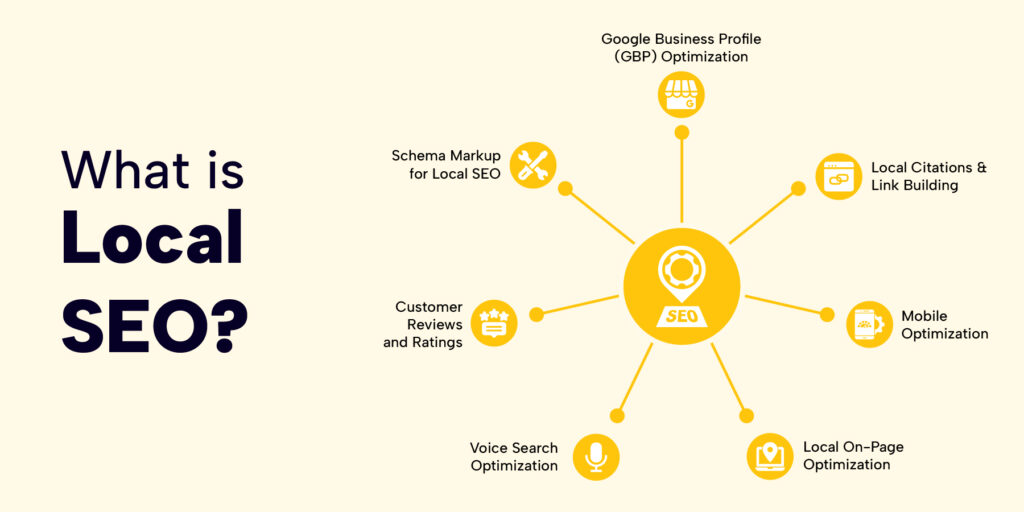
What is Local SEO?
Local SEO is a search engine optimization strategy that focuses on improving a business’s visibility in geographically related search results. It helps businesses attract customers searching for services or products within a specific location. While general SEO focuses on ranking websites nationally or globally, local SEO targets audiences within a specific geographic area, making it an essential part of marketing for businesses that serve a local customer base, such as restaurants, law firms, plumbers, or retail stores.
How Local SEO Works
Search engines like Google use local search algorithms to provide results relevant to the searcher’s location. For instance, when someone searches for “best coffee shops near me,” they intend to find a nearby cafe to visit, and Google displays both standard results and a Google Map Pack (also known as the local pack) featuring local businesses.
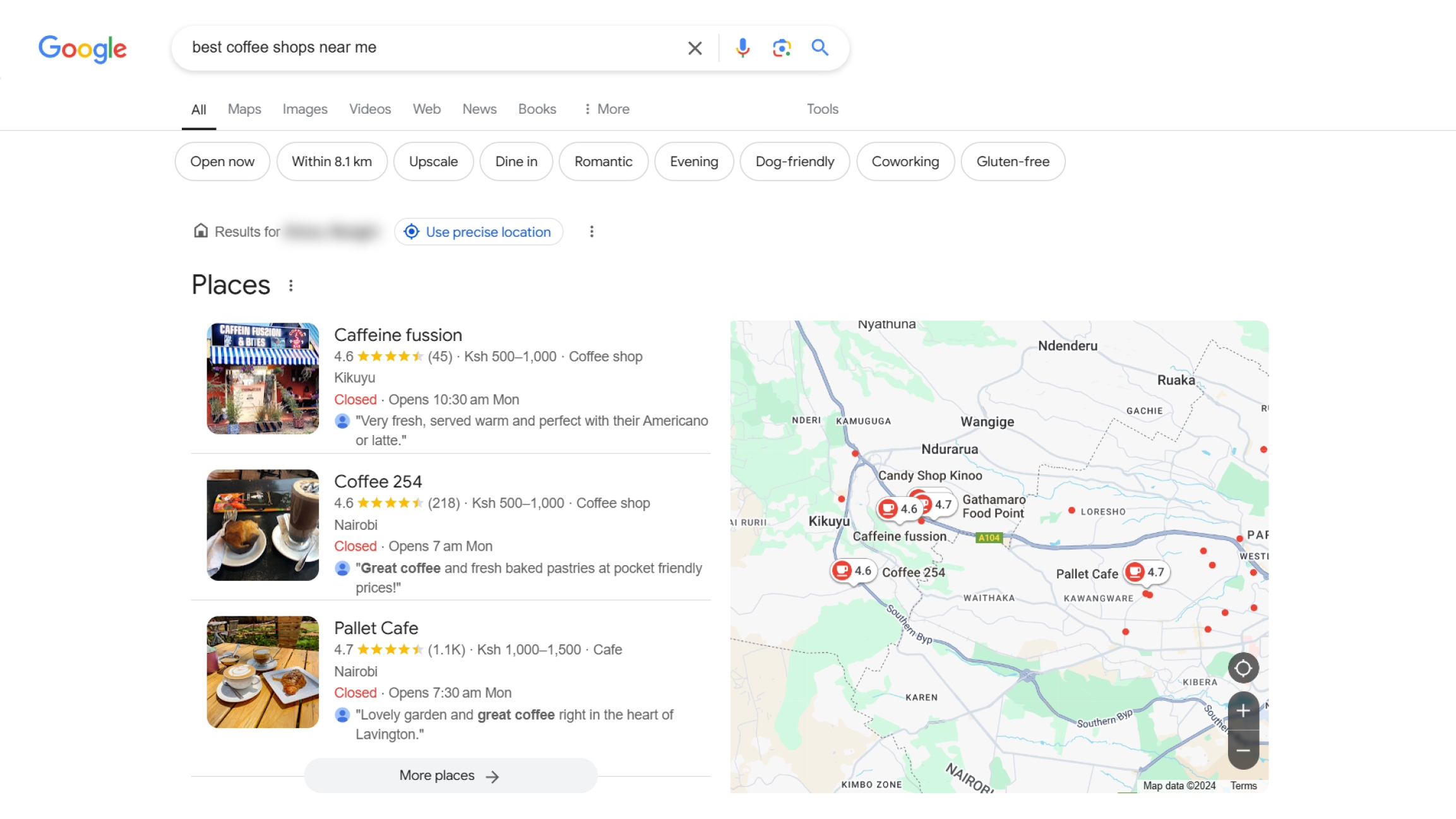
Optimizing your business for local SEO ensures it appears in these results, increasing visibility for nearby customers and improving your chances to rank in the local pack.
Why Local Search is Important for Small Businesses
Local search allows small businesses to compete for visibility in their local markets, where larger national or global companies may have less influence. Here are some reasons why local search is crucial:
- Increased Organic Traffic: Local SEO targets customers in your area, driving relevant traffic that’s more likely to convert into sales or visits.
- Increased Foot Traffic: For brick-and-mortar businesses, local search optimization leads to more foot traffic from customers who find you through “near me” searches on Google Maps and other local search platforms.
- Builds Trust and Credibility: Appearing in the top local search results signals trustworthiness and credibility, especially when combined with positive reviews.
- Cost-Effective Marketing: Local SEO is an affordable way to reach relevant local customers without overspending on broad, untargeted ads.
- Mobile Search Growth: With the rise of mobile devices and more people performing local searches on the go, local SEO can dramatically increase foot traffic and sales, as over 50% of “near me” searches lead to store visits.
88% of people who conduct a local search on their smartphone visit a related store within a week. (Google)
Now, let’s explore the actionable strategies to help you enhance your small business’s local search presence, ensuring potential customers can find you easily.
- Optimize Your Google Business Profile (GBP) Listing
What is Google Business Profile (GBP)?
Formerly known as Google My Business (GMB), Google Business Profile (GBP) is a free tool that helps businesses manage their presence on Google Search and Google Maps. It plays a vital role in local SEO, improving your business’s local search rankings and visibility to customers searching for nearby services.
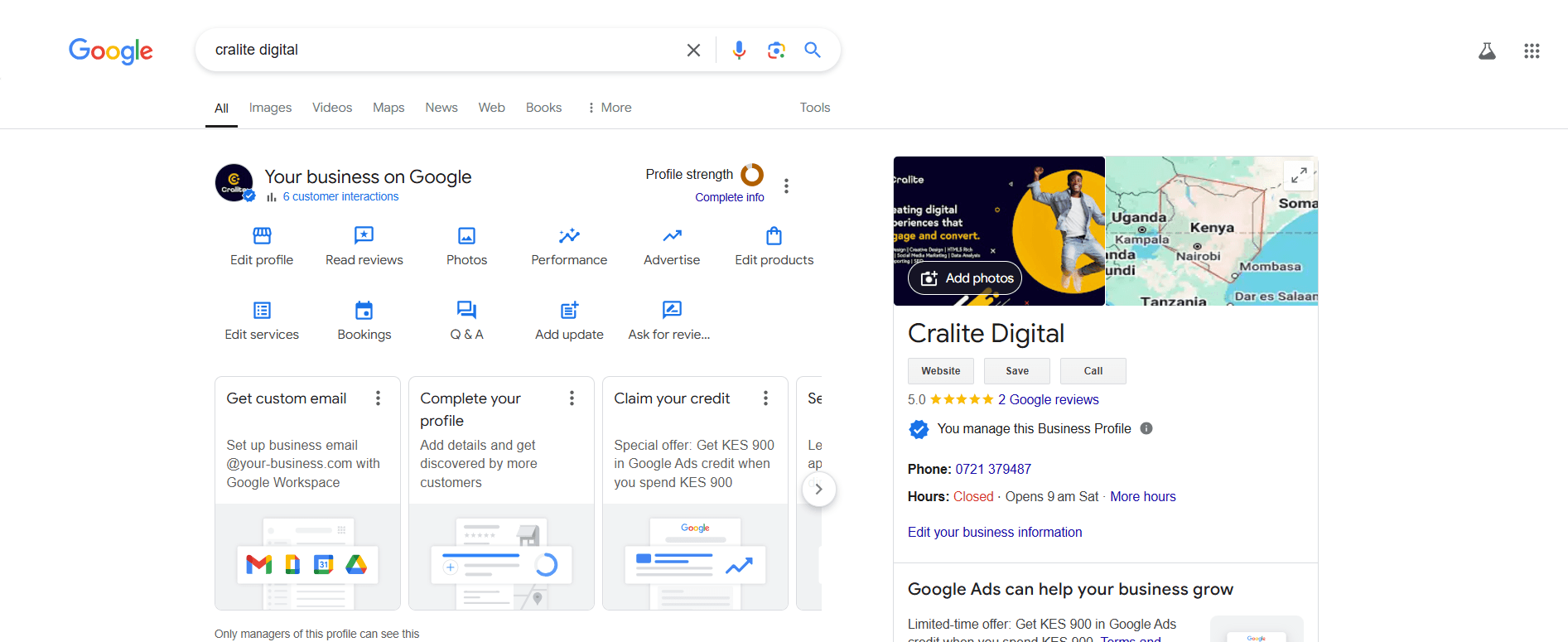
Key Elements to Optimize on GBP
- Business NAP: Ensure your Business Name, Address, and Phone Number (NAP) are consistent across all platforms, including your website and local business listings. This NAP consistency boosts your legitimacy in search engines and can directly impact local SEO rankings.
- Categories and Services: Select relevant categories for your business. Accurate categories help Google display your business for relevant search queries. Listing your services with descriptions further enhances your visibility in location-based searches.
- Adding Photos and Business Hours: Adding high-quality photos and updating business hours can significantly boost engagement on your GBP listing. Google prefers regularly updated listings, which can positively impact local rankings. Accurate business hours also help customers know when you’re open, preventing frustration.
- GBP Reviews and Engagement: Google reviews are a significant local SEO ranking factor. Encourage customers to leave reviews on your GBP profile and respond to them promptly. Engaging with both positive and negative reviews signals to Google that your business is active and customer-focused, which can further boost your rankings in local SEO results.
Boost Your Rankings Today! 🚀
Get Expert SEO Services for 10x Traffic Growth.
- Use Location-Based Keywords in Your Content
Understanding Local Keywords
Local keywords include location-specific terms like city or neighborhood names. They connect your business with potential customers searching for services in your area (e.g., “plumber in Nairobi”) and help improve your local search intent targeting.
Tools for Finding Local Keywords
Use tools like Google Keyword Planner, Ahrefs, Semrush or Moz Keyword Explorer to discover local keywords based on location, search volume, and competition.
Where to Incorporate Local Keywords in Website Content
Include local keywords in your title tags, meta descriptions, headings (H1, H2, H3), and body content to signal relevance to search engines while maintaining natural readability. This practice helps improve your website ranking for local searches.
- Create Location-Specific Landing Pages
What are Location-Specific Pages?
Local landing pages are web pages targeting individual cities or regions where your business operates. These pages should include details about your services in that specific location, local testimonials, and unique geo-targeted content tailored to the needs of customers in that area.
Optimizing Content on Location-Based Pages
If you offer multiple services, consider creating service-specific landing pages for each area. For example, if you’re a cleaning company, you could create separate pages for “carpet cleaning in Nairobi” and “window cleaning in Mombasa.” Ensure your location-based pages include all the elements needed to rank well in search results.
Types of Content to Create
- Blog Posts: Write about local events, trends, or news relevant to your audience. For example, a restaurant could discuss seasonal dishes inspired by local produce.
- Local Event Coverage: Cover or sponsor local events to generate buzz and boost visibility. Search engines reward fresh, locally-focused content.
- Case Studies Featuring Local Clients: Share success stories from local clients to build trust and enhance local SEO.
Using Local News and Events for Content Ideas
Stay updated with local news and events to create relevant, timely content that attracts local search traffic. Regular engagement with community topics signals to search engines that your business is active and involved.
- Build Local Citations and Directories
What are Local Citations?
Local citations are online mentions of your business’s NAP details across websites, directories, and social platforms. They help search engines verify your business’s legitimacy and relevance. Popular online business directories include:
- Google My Business
- Bing Places for Business
- Facebook Business
- Apple Maps
- TripAdvisor
- Yellow Pages
- Foursquare
- Yelp
Boost Your Rankings Today! 🚀
Get Expert SEO Services for 10x Traffic Growth.
- Encourage and Respond to Online Reviews
The Importance of Online Reviews for Local SEO
Online reviews are a key factor in local SEO rankings. They build trust with potential customers and signal to search engines that your business is active and engaging. When determining local search rankings, Google considers reviews’ quality, quantity, and frequency. Encouraging positive reviews is a powerful way to enhance your small business’s visibility.
Some 81% of consumers reported that they write reviews of local businesses at least occasionally, and 41% said they are more likely to choose a business that responds to its online reviews. (Soci)
Best Practices for Gathering Customer Reviews
Ask customers to leave reviews on your Google Business Profile or platforms like Google and Facebook. You can request feedback through follow-up emails, in-person requests, or by including review links on your website. Offering incentives (while adhering to platform policies) can also increase review responses.
Moreover, to generate a steady stream of positive reviews, businesses should focus on delivering excellent customer experiences and respond promptly to all feedback.
How to Respond to Positive and Negative Reviews
Engage with all reviews to show you value customer feedback. Thank customers for positive reviews and address negative reviews professionally and constructively. Responding to reviews shows your commitment to customer satisfaction, addresses common concerns, reinforces loyalty, and manages complaints effectively enhancing your reputation and local SEO rankings.
Effective review management is crucial, as 75% of consumers say they “always” or “regularly” read online reviews when researching local businesses (Brightlocal)
- Optimize for Mobile and Voice Search
The Rise of Mobile and Voice Search
As mobile devices dominate local searches, optimizing your website for mobile is essential for local SEO. With the growing popularity of voice search via assistants such as Siri, Alexa, Google Assitant, or an app that utilizes automatic speech recognition (ASR) technology to convert spoken words into a text query, optimizing for voice queries helps you stay competitive. A mobile-friendly, voice-optimized site can significantly improve local search rankings.
20% of searches in the Google App are now done by voice. (Google)
Tips to Make Your Website Mobile-Friendly
Ensure your website is responsive, automatically adjusting to fit different screen sizes. Compress large images to improve load times and simplify navigation to enhance the user experience; key elements that boost your general SEO performance and help improve your website ranking.
Targeting Voice Search Queries for Local SEO
To optimize for voice search, focus on conversational, question-based keywords (e.g., “Where is the best coffee shop near me?”). Including local keywords and natural language in your content helps voice assistants recognize and recommend your business in local search results.
- Leverage Local Link Building
Why Local Backlinks Matter for SEO
Securing local backlinks is critical for local SEO success. Links from area businesses, directories, or organizations signal to search engines that your business is authoritative and relevant in your community.
How to Acquire Local Backlinks
- Partnering with Local Businesses: Collaborate with other businesses through events, sponsorships, or cross-promotions. These partnerships can lead to valuable backlinks.
- Sponsoring Local Events: Event organizers often link to sponsor websites, providing high-quality local backlinks.
- Getting Featured in Local News Outlets: Pitch stories or offer expertise on local topics to earn authoritative backlinks from news sites.
- Ensure Your Website Has a Fast Load Speed
The Impact of Site Speed on Local SEO
A fast website enhances user experience and boosts your local SEO rankings. Google uses site speed as a ranking factor, and slow websites can lead to higher bounce rates and lower search rankings, costing you valuable local traffic.
Tools to Test Website Speed
Tools such as Google PageSpeed Insights, GTMetrix, Pingdom, and WebPageTest allow you to check your website’s speed and provide insights on how to improve load times.
Tips to Improve Website Load Times
Optimize images by compressing files and using modern formats like WebP. Use a fast host, minify CSS and JavaScript files, leverage browser caching, and consider using a Content Delivery Network (CDN) to reduce latency for users accessing your site from different locations.
Boost Your Rankings Today! 🚀
Get Expert SEO Services for 10x Traffic Growth.
- Use Schema Markup for Local SEO
What is Schema Markup?
Schema markup is a type of microdata that helps search engines better understand your website’s content. For local SEO, using schema markup can boost your business’s visibility by providing essential details like your location, operating hours, and services. Local business schema also allows search engines to display rich snippets, such as reviews and contact information, directly in search results.
How to Implement Local Business Schema on Your Website
To implement local business schema, use a plugin (if using WordPress) or manually add the markup code to the page in its HTML’s <head> section. Tools like Google’s Structured Data Markup Helper can help generate the code. Ensure your business’s name, address, and phone number (NAP) are correctly marked up to enhance local search visibility.
Testing Your Schema with Google’s Structured Data Testing Tool
After implementing schema markup, use the Rich Results Test to ensure everything is correctly set up. Enter your URL or code snippet. The tool analyzes your schema markup and provides recommendations in the right-hand side column.
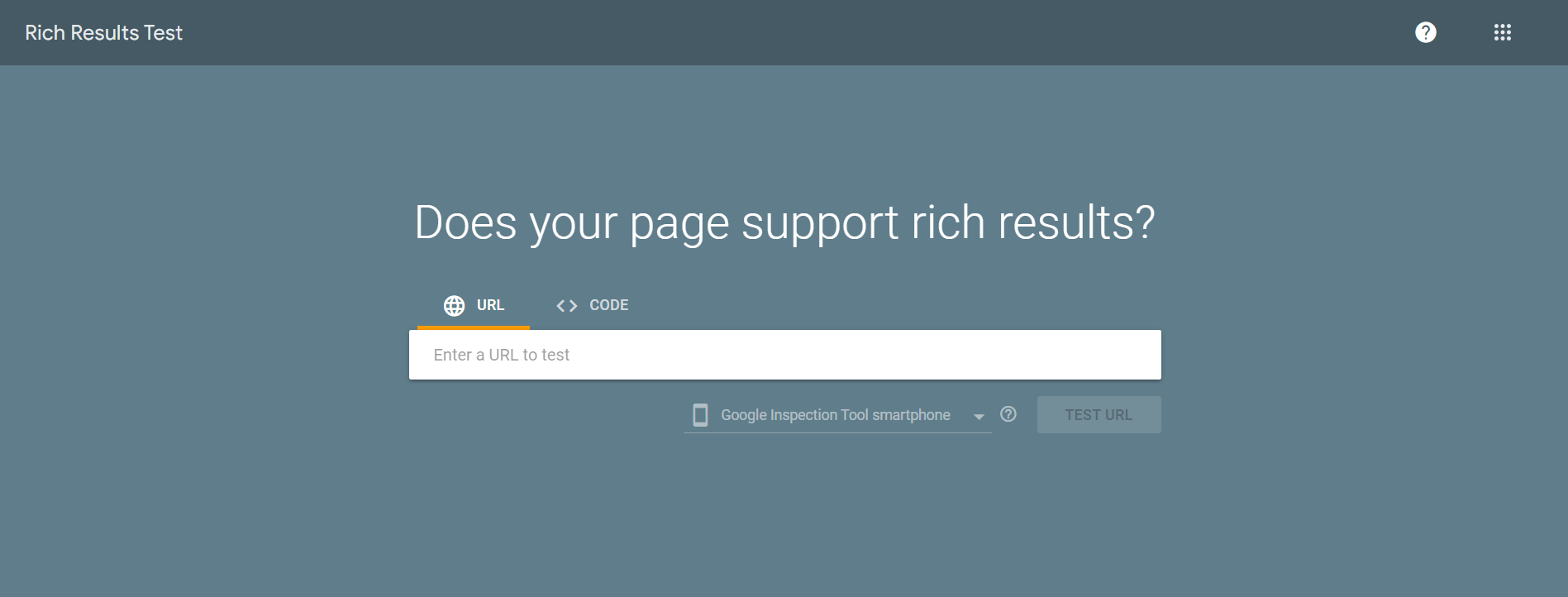
If you need to fix any errors, you can edit your code directly on the left side of the page. After you make changes, click the “TEST CODE” button at the bottom of the page to revalidate.
A well-implemented local business schema gives your business a competitive edge in local search rankings.
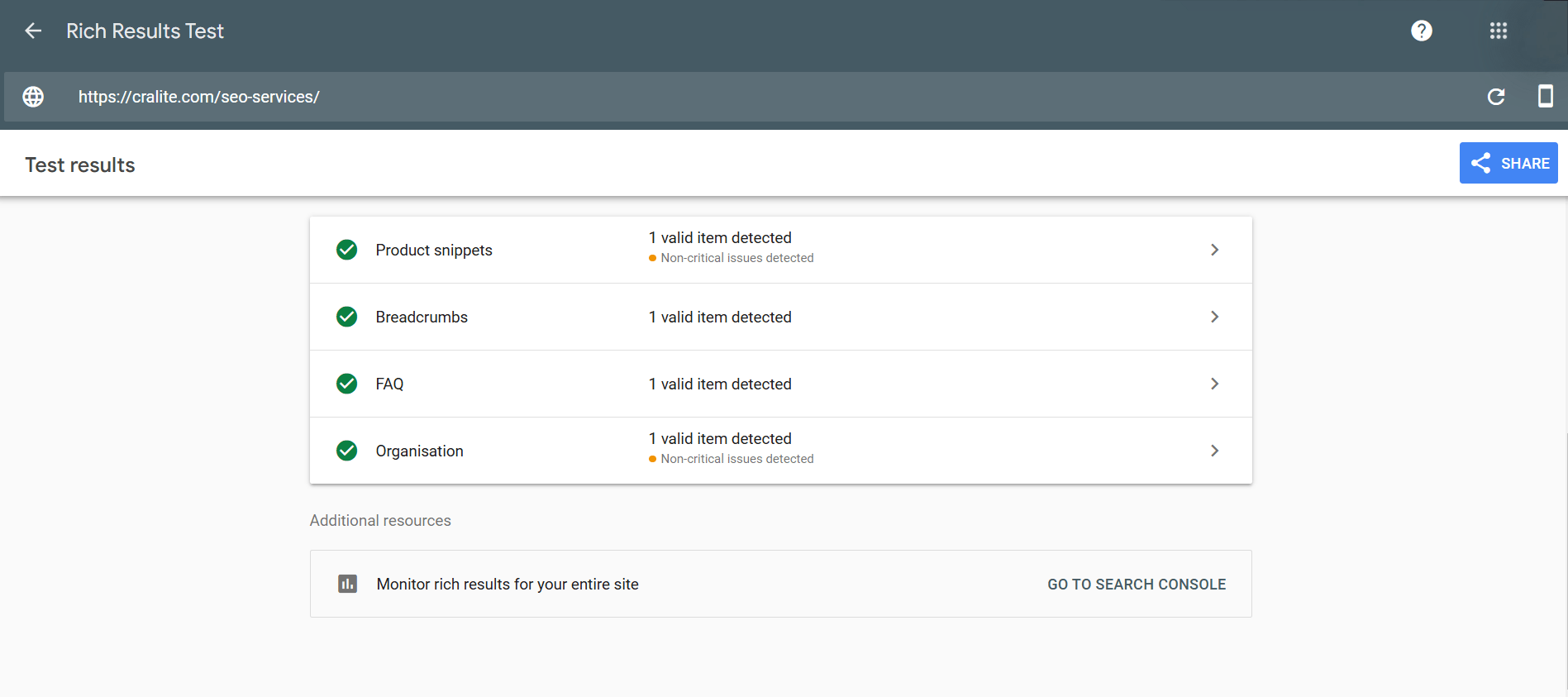
- Engage with Your Local Community on Social Media
The Role of Social Media in Local SEO
While social media platforms don’t directly influence local SEO rankings, they’re excellent tools for engaging with your local audience and building a community around your business. This can help generate awareness and drive traffic to your website, which indirectly benefits SEO.
How to Use Social Media to Boost Local Engagement
Post regularly about local events, exclusive deals, and news related to your business or community. Respond to comments and messages promptly to foster engagement. Use location-based hashtags and geotags to make your posts more visible to a local audience. For example, a restaurant in Nairobi could use hashtags like #NairobiEats or geotag their location in Instagram posts to attract local foodies. These actions boost your visibility and drive more local searches to your business.
- Monitor Local SEO Performance
Why It’s Important to Track Local SEO Metrics
Tracking your local SEO performance is crucial to identify successful strategies and areas for improvement. Regular monitoring allows you to refine your efforts, increase traffic, and improve local search rankings.
Tools for Tracking Local SEO Performance
Tools like Google Analytics, Google Search Console, and Google Business Profile Insights provide data on how customers find and interact with your business. Tools like Moz Local and BrightLocal help track citations and reviews, ensuring your local SEO strategies are on track.
Tools like Google Analytics, Google Search Console, and Google Business Profile Insights provide data on how customers find and interact with your business. Local SEO tools like Moz Local and BrightLocal help track citations and reviews, ensuring your local SEO strategies are on track.
Key Metrics to Watch for Improvement
When monitoring local SEO, pay attention to key metrics such as:
- Local search rankings: Track how your business ranks for relevant local keywords.
- Google Business Profile insights: Monitor views, clicks, and customer actions on your Google Business profile.
- Website traffic: Analyze how much of your website traffic comes from local search queries.
- Customer reviews: Keep an eye on the number, quality, and frequency of reviews across different platforms.
Frequently Asked Questions about Local SEO
How Long Does It Take to See Results from Local SEO Efforts?
Typically, it takes a few weeks to several months, depending on your market’s competitiveness and the consistency of your efforts. Regular updates to your GBP, reviews, and content help improve rankings over time.
Can Small Businesses Compete with Larger Companies in Local Search?
Yes, small businesses can effectively compete with larger companies in local search results by targeting niche local areas and maintaining excellent customer service and SEO practices.
Do Reviews Help Local SEO Rankings?
Yes, reviews are a crucial factor in improving local search visibility. When determining local rankings, Google considers the quantity, quality, and frequency of reviews. Positive reviews not only boost your online reputation but also help improve your visibility in local search results.
Is Mobile Optimization Necessary for Local SEO?
Absolutely. Most local searches are conducted on mobile devices, making mobile optimization crucial for local SEO success.
Local SEO is crucial for the success of any small business that wants to increase its visibility and attract more customers. Optimizing your Google Business Profile listing, using location-based keywords, building local citations, and engaging with your community online can significantly boost your business’s local search rankings. Regularly monitoring your local SEO performance and adapting to new trends like voice search will ensure long-term success.
Implementing these actionable local SEO strategies can help your small business thrive in an increasingly competitive local market. With consistency and a focus on delivering value to your local customers, you can achieve lasting results that boost your visibility and drive sales.
Boost Your Rankings Today! 🚀
Get Expert SEO Services for 10x Traffic Growth.
